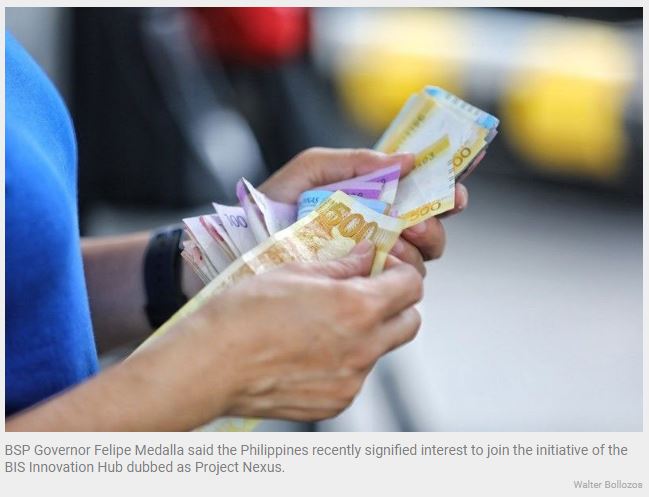Philippine pushes cross-border real-time payments
MANILA, Philippines — The Philippines is pushing an initiative of the Bank for International Settlements (BIS) to develop a multilateral solution connecting the real-time payment systems of participating countries, according to the Bangko Sentral ng Pilipinas.
BSP Governor Felipe Medalla said the Philippines recently signified interest to join the initiative of the BIS Innovation Hub dubbed as Project Nexus.
Project Nexus, which is a model for connecting national payment systems into a cross-border platform, is moving to testing phase from design phase.
It aims to make it easier for instant payment systems to connect to each other across borders, enabling cross-border payments in less than 60 seconds.
“Not only do we believe that digitalization will increase efficiency and improve governance, but we also see it as a way to expand financial inclusion,” Medalla said in a pre-recorded speech during the GCash Digital Excellence Awards 2022.
On cross-border payments, Medalla said the vision is to make it possible for payments within ASEAN using only mobile phones.
“We see tremendous benefits from smooth cross-border payments, especially for overseas Filipinos and their dependents,” he said.
The BSP is working toward linking InstaPay with the fast payment systems of our ASEAN neighbors, such as Singapore’s PayNow and Malaysia’s DuitNow.
At the sidelines of the G20 Summit last month, the BSP signed a deal with its counterparts from Indonesia, Malaysia, Singapore, and Thailand to deepen cooperation on payment connectivity.
He said the Philippines has come a long way in its digital finance transformation journey.
“We began with the test-and-learn approach in the early 2000s. Back then, the financial system was dominated by banks. But GCash, along with other service providers, offered an alternative domestic money transfer scheme in the form of e-money,” Medalla said.
Under its Digital Payments Transformation Roadmap, the central bank aims to convert 50 percent of total retail payments to electronic channels and increase the number of Filipino adults with bank accounts to 70 percent by 2023.
With the COVID-19 pandemic serving as catalyst, the share of digital payments to total retail transactions grew to 30.3 percent last year from 20.1 percent in 2020, while the number of banked Filipino adults almost doubled to 56 percent.
Medalla said payments by persons to merchants, fund transfers between two persons as well as salary and wage payments by businesses continue to drive digital payments growth.
He said the central bank continues to spearhead digitalization initiatives that serve as financial lifelines to micro, small, and medium enterprises (MSMEs) and the microfinance sector.
“We want to ensure that every microentrepreneur has the means to flourish in the new digital economy,” he said.
Medalla said the BSP is set to launch the Request to Pay and Direct Debit facilities soon after the introduction of the interoperable Bills Pay PH facility.
As a regulator, the BSP is also working toward managing and reducing these risks through tough and responsive regulations.
“The BSP is crafting cybersecurity policies that will require banks and other financial institutions under our supervision to adopt even more robust technology risk management systems and effective cybersecurity resilience controls and measures,” Medalla said.
Source: https://www.philstar.com/business/2022/12/04/2228301/philippine-pushes-cross-border-real-time-payments


 English
English




